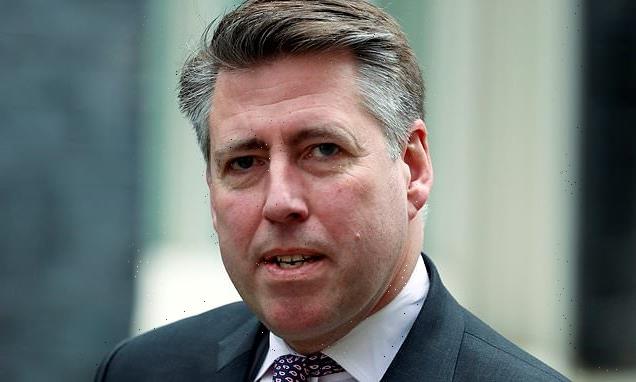As thousands are allowed a permanent deal meaning they only need be in the office 40 per cent of the time, SIR GRAHAM BRADY says government staff who STILL insist on working from home are ruining this country
- Civil servants are supposed to serve the state and public – but can’t from home
- In many parts of government only one in five officials bother to turn up
- Not all jobs need to be done from the office, but it’s more efficient when they are
- We can’t have another Kabul, with Foreign Office staff working from home
Being a civil servant means taking on a commitment to the public good. The very term Civil Service denotes a body of officials whose job it is to serve the State and serve the public.
By long tradition in Britain, civil servants work for the public good, diligently, anonymously, with the reward coming at the end of a career with a decent pension and, occasionally, an honour.
Many still do.
Look at the people who worked on the Vaccine Taskforce. They are some of the many unsung heroes in our country during the pandemic.
Graham Brady (pictured outside No 10 in 2019) is chair of the 1922 Committee of Tory MPs
Doubtless, by necessity, much of that noble work was done by people working from home. But now that the restrictions have been lifted, they should be returning to the office. After all, that is what much of the country has done.
It is simply unacceptable for so many of our public servants to continue sitting at home.
Mail on Sunday readers enjoying a well-earned Easter break from their factories and offices this weekend will be shocked to learn that in many parts of government only one in five officials bother to turn up.
I am told that some Whitehall departments still look like the Mary Celeste.
It is true that many workers, in both the public and private sectors, got used to working from home over the past two years – and that many still want to.
Of course, not all jobs need to be done in the office – a trend that was developing even before Covid struck. But it is undeniable that for most people, working in the office – with all the interactions and contacts that brings – is far more efficient.
Working from home can be easier – but it’s also much less efficient, Brady writes (file image)
Working from your garden shed or spare room is simply harder. Productivity is reduced. Tasks take longer and work is often delivered when it suits the employee – not when the customer needs it.
And in the case of young, new recruits, it is essential that they are in the office atmosphere – interacting directly with their managers and not marooned at home with only a Zoom call to connect them to colleagues.
Much as I admire the work of our public servants, it is hard to escape the suspicion that – unlike the private sector – their managers are not pushing them to return to work in the office.
How else do we explain why, as the Mail on Sunday reveals today, so many civil servants in London-based offices are still not coming into the office to work?
And only yesterday, the Daily Mail revealed that mandarins have quietly instituted ‘hybrid working’, where staff are required to spend as little as 40 per cent of their working week in the office. An audit by the newspaper found that on a typical Monday last month, many publicly-funded bodies had less than ten per cent of their staff in the office.
During the crisis in Kabul last summer, too many Foreign Office staff were working from home
Some had less than five per cent – and one had none at all.
Of course, I know that when they read this article, the unions and some senior managers will react with anger. They will insist that the Civil Service is full of dedicated, talented and seriously underpaid staff who put up with daily vilification as they get on with their job.
They will argue that working life has changed and that working from home is the new normal.
They may convince themselves of this.
But it’s easy for civil servants to kid themselves that they are just as efficient working at home, because they don’t operate in the commercial market place.
As I have said, working from the office is simply more efficient.
Look at the chaos of the Kabul evacuation last summer, when some Foreign Office crisis managers were at home – not in the office.
Look at the mess at the Driver and Vehicle Licensing Agency where 40 per cent of staff are still not turning up to work at all.
There are huge backlogs and people who need new licences to drive Heavy Goods Vehicles or do their daily work are simply not getting them.
I am sure those dedicated people in government service know there is a problem.
They want to do their job properly. But they face an environment that makes it difficult.
I hear that some departments haven’t even got canteen facilities running properly yet and that some still insist on masks.
People who want to come into the office are discouraged from doing so by colleagues who fear it will make it harder for them to stay at home.
And in the end, if all you are doing is a Zoom call with your team from the office rather than from home, why bother?
It’s time for the managers of the Civil Service to get a grip and do their jobs.
We are always being told that the problem in government is not the Rolls-Royce permanent bureaucracy but weak Ministers who don’t know what they want and can’t give clear instructions.
Well, here is a test case.
Ministers from the Prime Minister down have been utterly clear they want people back in the office. Steve Barclay, the Prime Minister’s Chief of Staff, gave an unambiguous instruction to this effect at the end of January.
And yet it is not happening.
It is not happening because some of the senior bosses of the Civil Service and their HR departments think they can get away with it not happening.
Some seem to see their jobs as negotiating with their staff rather than managing them.
This surely has to change.
Wherever possible, civil servants must be required to go into the office as part of their contract
Wherever possible, civil servants must be required to be in the office a minimum number of days a week and be told they will be in breach of their contracts if they are not.
If people are paid a London weighting but never actually go to London, then they must lose it.
Risk-averse HR managers must remember they are there to make the organisation as a whole work.
Ministers too must back up their officials and be prepared to face down the unions.
This is a matter of vital national interest. A modern state can’t work without an effective government.
For Britain, which after Brexit has to compete with the very best in the world to the very highest standards, this is even more critical.
It’s time to get serious.
It’s time to get people back to work.
Source: Read Full Article




